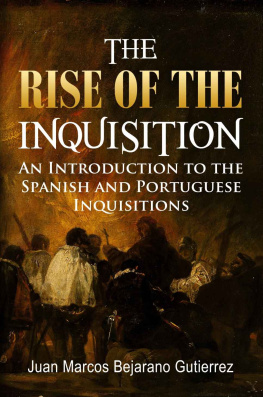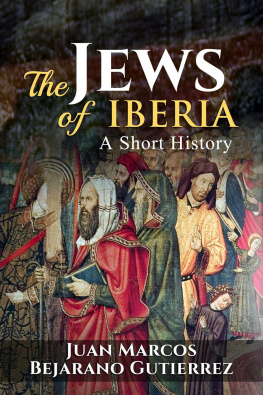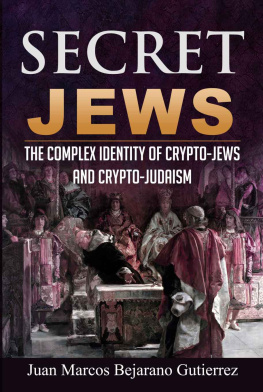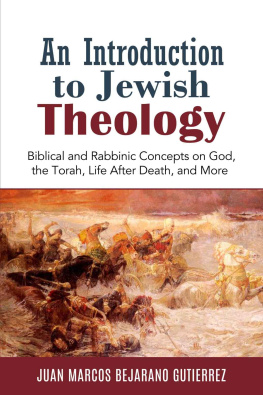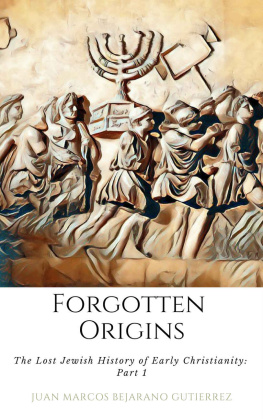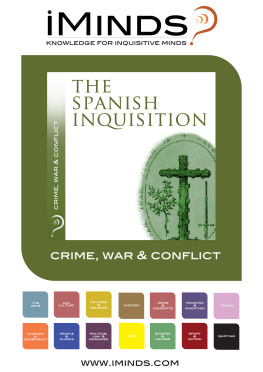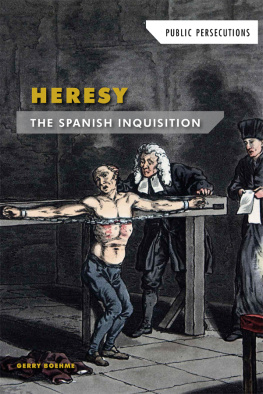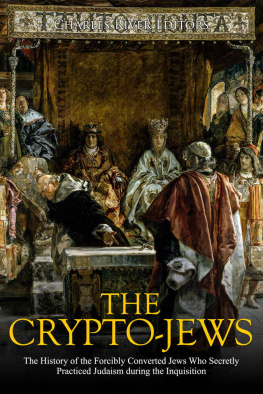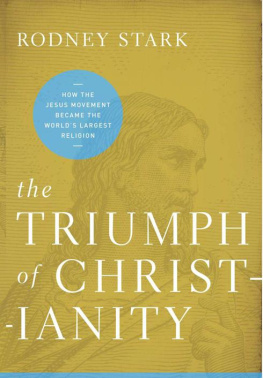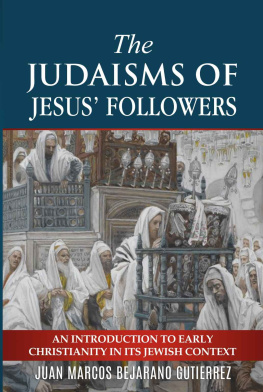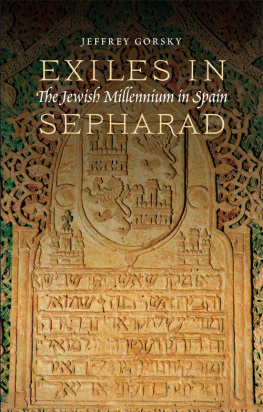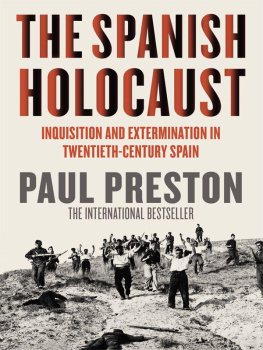The Rise of the
Inquisition
An introduction to the spanish
and portuguese inquisitions
Juan Marcos Bejarano Gutierrez
Yaron Publishing
Grand Prairie, Texas
Copyright 2017 by Juan Marcos Bejarano Gutierrez.
All rights reserved. No part of this publication may be reproduced, distributed or transmitted in any form or by any means, including photocopying, recording, or other electronic or mechanical methods, without the prior written permission of the publisher, except in the case of brief quotations embodied in critical reviews and certain other noncommercial uses permitted by copyright law. For permission requests, write to the publisher, addressed Attention: Permissions Coordinator, at the address below.
Juan Marcos Bejarano Gutierrez.
Yaron Publishing
701 Forest Park Place
Grand Prairie, Texas 75052
Printed by CreateSpace
www.createspace.com
Book Layout 2017 BookDesignTemplates.com
Ordering Information:
Quantity sales. Special discounts are available on quantity purchases by corporations, associations, and others. For details, contact the Special Sales Department at the address above.
The Rise of the Inquisition / Juan Marcos Bejarano Gutierrez. 1st ed.
ISBN 978-154722287
Contents

Sign up at CryptoJewishEducation.com
and
Receive the First Chapter of Secret Jews Free!
To my sons Eliel Nathan and Yaron Eliav
May they be like Menasseh and Ephraim
They are martyred so much that in the poverty and abandon to which they were driven by this monster, they kill their own children, burn their husbands, deprive their brothers of life, increase the number of orphans and widows, impoverish the rich, destroy the powerful, make thieves of the nobly born, and sow base and infamous places with modest and chaste women.
Regarding the Victims of the Inquisition
Samuel Usque
The Consolations for the Tribulations of Israel Translated by Martin Cohen
Introduction
T he Inquisition typically conjures up images of intolerance, persecution, and violence and rightly so. Many people think of it as a reflection of the spiritual, scholastic, and scientific darkness of the medieval period. Hundreds of thousands of trials were processed during its lengthy reign. Thousands died at its hand. It seems hard to believe that the Inquisition ended as recently as the third decade of the nineteenth century and then only with some reservations.
The Spanish and Portuguese Inquisitions that began in the late 15th and 16th centuries and lasted well into the 19th century were rooted in the papal inquisitions of the earlier medieval period. The purpose of these tribunals was to arrest and punish persons who deviated from accepted beliefs and practices of the Church. These courts, in turn, were ultimately linked to the religious panels established as early as the reigns of the Roman Emperors Theodosius in the West and Justinian in the East.
The institution as it is now known, began in the thirteenth century when it was set up to combat the heretical sect of the Albigenses. The Albigenses or Cathars embraced Gnostic beliefs that held the God of the New Testament was distinct from the God of the Old Testament. One was opposed to the other.
The Papacy entrusted the Inquisition to the mendicant orders of Dominicans and Franciscan friars. The mendicant orders were bound by a vow of poverty and an ascetic lifestyle. Local bishops had the authority to investigate heresy, but the mendicant orders provided a more extensive organization. The medieval Inquisition had the power to punish Jews who aided Jewish converts to return to Judaism. The Inquisition also had the authority to order testimony by Jews against lapsed converts. In its early years, however, little attention was paid to Jews other than an occasional action focused on banning or burning certain Jewish books which had been deemed heretical or offensive to Christianity.
The Inquisition in its Spanish and later Portuguese forms arose near the twilight of an extended Jewish civilization in the Iberian Peninsula. For approximately the first forty years of the Spanish Inquisition, the primary concern was Judaizing. The term Judaizer was used to designate those Jewish converts to Christianity who had returned to Jewish practice. Occasionally, Old Christians who adopted Jewish practices or converted to Judaism were also tried as Judaizers. The problem was not new, and limited cases of Judaizing were reported in previous centuries. The difference was in the scale of the problem in the 12 th and 13 th centuries versus the 15 th and 16 th centuries.
The emergence of the Spanish Inquisition is tied to the tragic events which unfolded near the close of the 14th century in the Kingdoms of Castile and Aragon. After more than a thousand years of continuous existence, in 1391, a new era in Jewish history began. Jewish communities throughout the Peninsula except those in the Kingdom of Portugal and the Kingdom of Granada were attacked en masse. Long-held Christian anti-Judaism and widespread political and economic discontent stoked the violence. The attacks forever altered the position of Jews in the Iberian Peninsula.
Thousands of Jews were murdered, and many more converted to Christianity under the direct threat of violence. The sheer scope of the attacks in 1391 overshadowed the severity of previous persecutions. The conversion of thousands of Jews initiated a social and religious crisis that lasted more than a century.
The Jews who converted to Christianity at the end of the 14 th century and for the next one hundred years were known as Conversos in Christian literature and primarily as anusim, i.e., forced converts in Jewish texts. Many of these converts retained Jewish practices. The continued observance of Jewish customs marked them as heretics. Since their initial conversions were under duress, some Christians believed that leniency and time should be extended to them to embrace Christianity sincerely, but patience was wearing thin.
In 1478, King Ferdinand and Queen Isabella convinced Pope Sixtus IV to authorize a new Inquisition with unparalleled authority to search out lapsed converts. Pope Sixtus IV extended this authority in his bull titled Exigit sincerae devotionis. Inquisitional tribunals had existed in previous centuries, and local bishops had investigated Judaizing among Conversos as early as 1393 in the Kingdom of Aragon. However, King Ferdinand and Queen Isabella saw Judaizing as spiritual cancer that required a national response. The previous Inquisitional tribunals headed by local bishops were seen as ineffective. The Pope granted this new Inquisition unique authority. The Inquisition was meticulous in its dealings and tried thousands of Conversos for heresy.
The Inquisition operated amidst the resentment that many Old Christians felt towards Conversos. Many Conversos had taken advantage of the new found social and economic opportunities open to them as Christians. The fact that many Conversos continued to practice Judaism secretly only heightened the hatred.
The Spanish Monarchs decided that despite the confiscation of property, imprisonment, and execution, the magnitude of Judaizing among Conversos was so high, that more action was needed. In 1492, frustrated with ongoing Judaizing practices, the Spanish monarchs ordered the expulsion of all unbaptized Jews.
According to King Ferdinand of Aragon and Queen Isabella of Castile, Judaizing by Conversos was the primary reason for their decision to order the expulsion of all unbaptized Jews from their Iberian and overseas dominions. The monarchs argued that some unbaptized Jews had aided and abetted Conversos in returning to the Jewish faith. The only way to resolve the problem was the absolute separation of the two groups.
Next page
